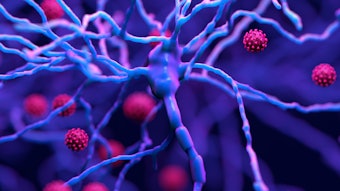Trial launches to attack post-stroke cognitive impairment head on
Between traditional mechanisms of dementia, such as neurodegeneration and vascular abnormalities, lies stroke, an under-investigated cause of cognitive impairment and dementia.

Between traditional mechanisms of dementia, such as neurodegeneration and vascular abnormalities, lies stroke, an under-investigated cause of cognitive impairment and dementia.
“As much as 70% of patients after stroke develop some degree of cognitive impairment or dementia. But when we talk about stroke outcomes, we always talk about the ability to walk or perform a specific task. Few initiatives are focused on the specific measurement of subtle cognitive outcomes,” said Natalia S. Rost, MD, MPH, FAAN, FAHA, chief of the stroke division of the MGH department of neurology and professor of neurology at Harvard Medical School in Cambridge, Massachusetts.
That is about to change. In Thursday’s session: “Post-Stroke Cognitive Impairment and Dementia: A Global Effort,” Rost introduced the DISCOVERY (Determinants of Incident Stroke Cognitive Outcomes and Vascular Effects on RecoverY) study, the NIH-funded collaborative network of multicenter sites with access to large diverse acute stroke populations and expertise and capacity to systematically access for post-stroke cognitive outcomes.
“It’s essentially a Moonshot project to investigate stroke subtypes that ultimately result in cognitive impairment and dementia,” Rost said. As the principal investigator, Rost will lead the initiative’s big data collection for stroke outcome analysis. DISCOVERY brings together multidisciplinary experts in stroke, clinical trials, neuroimaging, vascular neurology and genetics, and a network of 30 academic medical centers with the capacity and expertise to enroll patients of different stroke subtypes, including ischemic stroke, intracranial hemorrhage and aneurysmal subarachnoid hemorrhage, with a target of enrolling 8,000 patients during their hospital admission over the next three years. To investigate the underlying pathophysiology of post-stroke cognitive impairment and dementia, DISCOVERY will specifically target different stroke subtypes and diverse U.S. populations.
“We have a very ambitious goal to enroll a minimum of 2,000 Black patients and a minimum of 2,000 patients of Hispanic background,” Rost said. “Those populations are grossly understudied in close to every possible domain, and particularly in the field of dementia.” To best accommodate Spanish speaking only patients, all DISCOVERY research procedures, including cognitive testing, will be conducted in English and Spanish.
DISCOVERY researchers will collect all patient neuroimaging data, including MRIs and CT scans to outline the infarct lesions on ischemic strokes and hematomas on hemorrhagic strokes and map those lesions based on location in the brain and size of the lesions by volumetrics.
“We will be able to combine these data and use machine learning and other big data science approaches to understand which part of the brain gets damaged more frequently in stroke patients who experience a particular type of cognitive impairment,” Rost said. Investigators will also conduct whole exome sequencing on all participants, with more detailed phenotyping on a subset of 2,000 patients, who will undergo a minimum of two years of follow-up with repetitive studies of cognitive function, powerful research MRI scans and blood sampling to evaluate gene expression profile and other genetic markers as well as serum amyloid, phosphorylated tau and biomarkers of endothelial dysfunction. A subset of 350 patients will also undergo amyloid and tau PET brain imaging.
“DISCOVERY is unique because we had the opportunity to build it and dream big,” Rost said. “It will result in a rich set of repository data, both clinical and neuroimaging, and laboratory data that will be an enduring resource for future investigators to test hypotheses and continue to produce scientific outcomes.”








